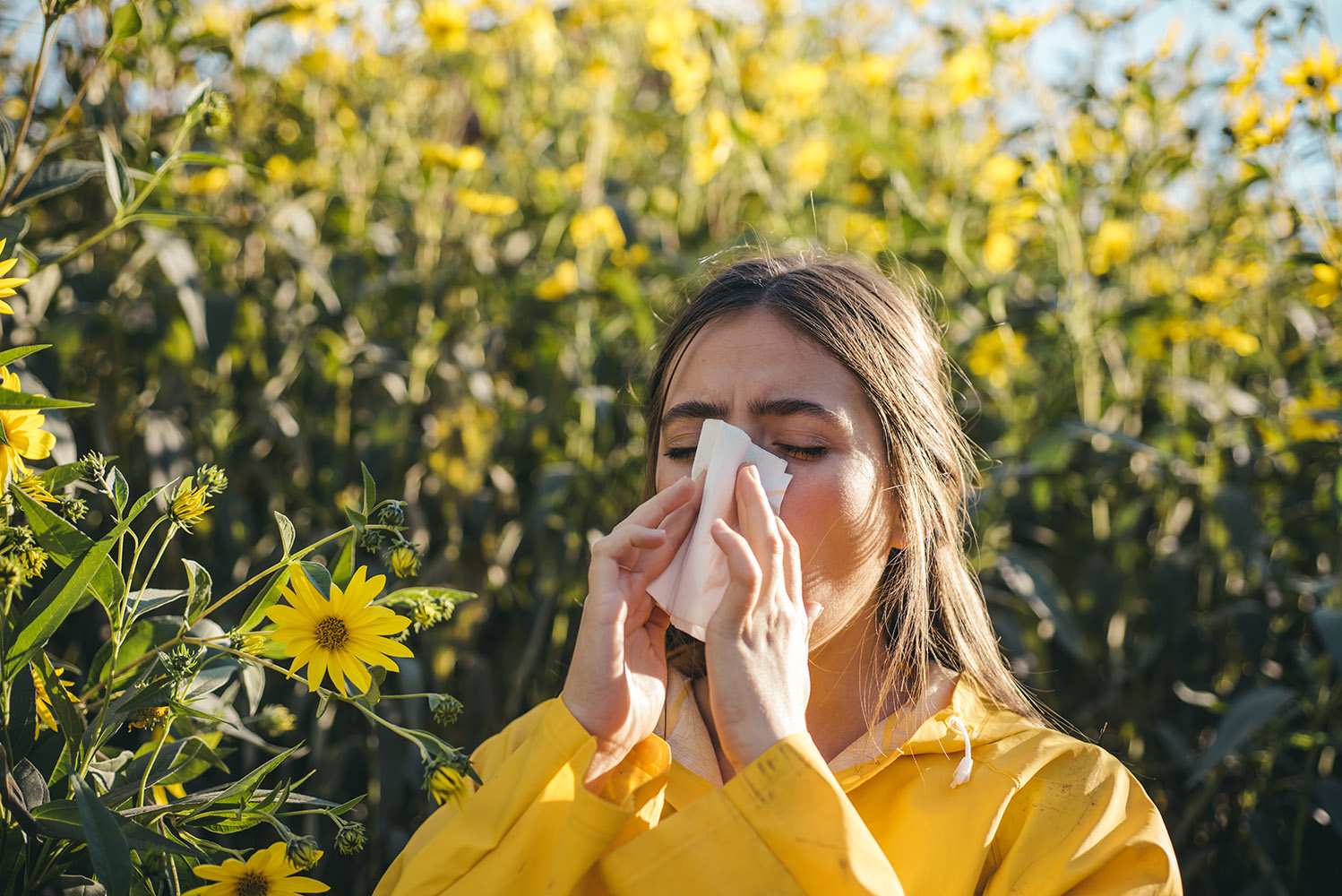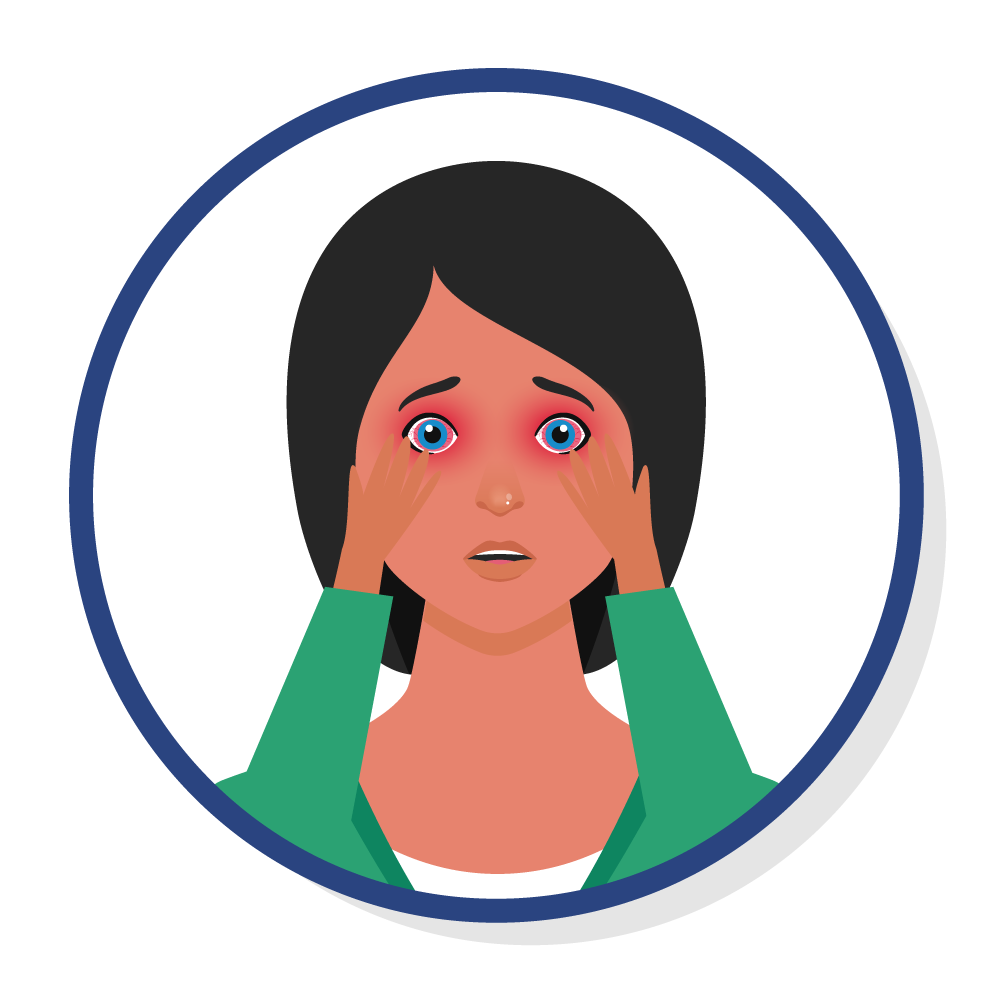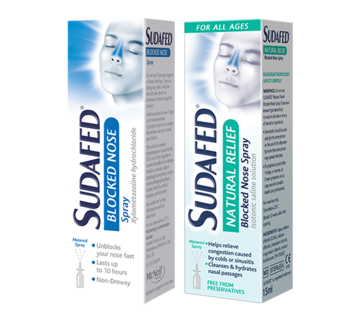Hay fever symptoms and treatment
Hay fever, sometimes known as allergic rhinitis, is a common condition that causes your immune system to react to pollen1, which can be irritating if you enjoy spending the warmer months outside. Hay fever symptoms can be similar to the symptoms of a common cold2. They can include:
- Sneezing
- Congestion
- Runny nose
Most people with hay fever notice symptoms during the spring and summer months, from late March to September3. The exact timing will depend on which type, or types, of pollen you're allergic to4.
Because of its similarity to the common cold, congestion associated with hay fever can be managed with over-the-counter decongestants5.
In this article, we look at what causes hay fever, common hay fever symptoms, potential treatments and more.
- What is hay fever?
- What causes hay fever?
- Hay fever symptoms
- When is hay fever season?
- Hay fever treatment
- Frequently asked questions
What is hay fever?
Hay fever, the common name for allergic rhinitis, is an allergic reaction to pollen that affects one in five people at some point in their lives. In fact, there are an estimated 10 million people with hay fever in the UK6.
The reaction can cause inflammation and irritation in the nose, which contributes to several of the main symptoms of hay fever7. Usually, treatments can reduce the intensity of symptoms8, but if left untreated symptoms can become long-term9.
Hay fever affects people of all ages and can develop at any stage of life, from childhood to teenage years and even into adulthood10. However, it’s more common for the condition to develop in childhood and it affects more boys than girls11.
What causes hay fever?
Hay fever is caused by an allergy to different types of pollen12. An allergic reaction is when your immune system mistakes a harmless substance, known as an allergen, for a harmful one13. With hay fever, the allergen is pollen14.
When this happens, your immune system will start to produce and release antibodies15. The antibodies then cause your blood vessels to widen and trigger the release of histamines to fight the allergen16. This causes the familiar sniffling, runny nose and itchy eyes that you associate with hay fever17.

There are around 30 different types of pollen that can cause hay fever and you may find you react to just one or several18. The most common types of pollen that cause an allergic reaction include:
- Tree pollen – affects around 25% of hay fever sufferers in the UK19
- Grass pollen – affecting 90% of hay fever sufferers in the UK20
- Weed pollen – less common than tree or grass allergies21
Within each of these categories, there are several different pollen species which could cause a reaction. So having a tree allergy doesn’t necessarily mean you’ll react to every type of tree. Several factors can increase your risk of developing hay fever. These include:
- Having asthma
- A family history of hay fever
- An existing allergic condition, such as eczema
- Exposure to pollution, tobacco smoke and diesel exhaust particles during childhood22.
Hay fever symptoms
The primary symptoms of hay fever are usually the same in every case. These can include sneezing, itchy eyes and a blocked or runny nose23.
image-2022-07-29-13-43-27-105.png

Frequent sneezing
One of the most common and recognisable signs of hay fever, sneezing is your immune system's way of trying to push the pollen out of your body24.
Runny or blocked nose
The histamine produced by your immune response to pollen can cause your nasal passages to become inflamed, triggering excess mucus production, causing a blocked or runny nose25.
itchy_eyes.png

Itchy, red or watery eyes (allergic conjunctivitis)
If our eyes come into contact with pollen, they may start to water as a way of flushing the allergen out26. The itchiness and redness are typically caused by your immune response trying to fight off the allergen27.
An itchy throat, mouth, nose and ears
Any itchiness in your throat, mouth, nose and ears is likely to be a result of the histamines produced by your immune response reacting to pollen28.
image-2022-07-29-13-43-41-401.png

Cough
A hay fever cough can develop because of a postnasal drip. This is where excess mucus produced by your immune response drips down your throat from the back of the nose29.
Loss of your sense of smell (anosmia)
Your allergic reaction to pollen may can irritate the mucous membranes inside your nose which can impact your ability to smell and taste30.
sud-sinus_pain-icon.png
Facial pain
Some people find that their hay fever blocks their sinuses, this is known as sinusitis31. Sinuses are small chambers and passages in your head which can cause facial pain when blocked32.
Earache
Because your sinuses are close to your ears, they can cause earache when swollen33.
sud-headache-icon.png
Hay fever headache
Allergies like hay fever can sometimes cause one of two different types of headache:
- Sinus headache
- Migraine34
A hay fever headache will usually develop around the areas above your sinuses35. That's around your cheekbones, eyes, the bridge of your nose and your forehead36. You might also experience pain in one side of your head, nausea and sensitivity to light if your allergies trigger a migraine37.
Tiredness and fatigue
When your hay fever is bad, you may find your stuffy nose makes it harder to sleep38. Plus, an allergic reaction also causes your body to produce certain chemicals, making you feel tired39.
Hay fever or cold?
While hay fever symptoms are like those of the common cold40, there are some key differences between the two conditions.
The main difference between the two conditions is that a cold will usually cause a fever and body aches, while hay fever only tends to affect the head area41. Find out more about how to spot the differences between hay fever and a cold.
When to see a doctor
You can usually manage your hay fever by speaking to a pharmacist and taking their recommendations for over-the-counter allergy relief42.
When is hay fever season?
Hay fever season typically falls between late March and September44. This is because pollen counts are usually at their highest at this time of year. The warmer, more humid weather can also contribute to a rise in hay fever.
The specific time your hay fever will be at its worst will typically depend on which pollens you're allergic to45.
- Tree pollen is typically at its peak from late March to mid-May46
- Grass pollen levels are usually highest from mid-May to July47
- Weed pollen tends to peak at the end of June through to September48.
Hay fever treatment
Hay fever doesn't have to get in the way of you enjoying the warm weather during spring and summer. There are plenty of ways you can minimise the impact of your pollen allergy and reduce your symptoms. Here are our top 10 tips to help you manage your hayfever symptoms.
1. Vaseline
- Putting Vaseline around the rim of your nostrils can help trap pollen and stop it from entering your nose49.
2. Pick the right sunglasses
- Wraparound sunglasses protect your eyes from pollen, reducing the risk of them becoming itchy, red or watery50.
3. Change your clothes
- If you've been outside for a while, change your clothes as soon as you get home and shower to wash away any pollen spores51.
4. Dry your clothes inside
- Being able to hang your washing outside might be a nice bonus to some people during the warmer weather, but it increases the risk of pollen sticking to the fibres of your clothes. Dry your clothes inside to keep them clean and reduce the risk of a reaction53.
5. Stay inside
- If you can, stay inside as much as possible and keep windows and doors shut where you can54.
6. Spring clean
- Keep your home pollen-free by regularly vacuuming and dusting surfaces with a damp cloth55.
7. Stop smoking
- Smoking or being around cigarette smoke can make your allergy symptoms worse, so it’s best avoided56.
8. Use a pollen filter
- You can buy a pollen filter for your car's air vents to keep your air conditioning system pollen-free56.
9. Avoid fresh flowers
- They might look lovely but having fresh flowers about the house could trigger hay fever symptoms57.
Allergy nasal sprays
Using a hay fever nasal spray can help to relieve a number of your allergy symptoms including a blocked or runny nose. Our nasal sprays containing the active ingredient xylometazoline, such as SUDAFED® Blocked Nose Spray, provide rapid relief from nasal congestion. Alternatively, SUDAFED® Natural Relief Blocked Nose Spray, a preservative-free isotonic saline solution, can be used to provide natural congestion relief and wash away allergens from the nose.
SUDAFED® is the most popular decongestant brand on the market and has been pioneering clinically proven over-the-counter congestion treatments for over 30 years58.
sudafed-2-products-v2.png

Frequently asked questions
How can I relieve hay fever?
There are a few ways to help minimise your symptoms. Staying inside and reducing your contact with pollen is one option59. But if you want go outdoors, you could try rubbing Vaseline around your nostrils to catch some of the pollen60.
You can also try SUDAFED® Natural Relief Blocked Nose Spray to help wash away allergens from your nose or an over-the-counter decongestant to help relieve a blocked or stuffy nose.
Back to topCan hay fever cause a cough?
Yes, it can sometimes. The excess mucus produced by your immune response to pollen can cause a postnasal drip61. This is where mucus drops from your nose down the back of your throat and can cause a hay fever cough62.
Back to topWhat are hay fever symptoms?
The most common symptoms of hay fever include:
- Sneezing
- A blocked or runny nose
- Itchy, red or watery eyes
- Fatigue
- Sinus pain63
Can you suddenly get hay fever?
Most people develop hay fever in childhood or their early teens, but it is possible to develop the condition later in adulthood64.
Back to topWhat triggers hay fever?
Hay fever is triggered by your immune response reacting to pollen spores. It is an allergic reaction triggered by your body mistaking harmless pollen for a dangerous substance, causing your immune response to spring into action to protect you65.
Back to topIs hay fever worse at night?
If your hay fever is causing a blocked nose, you might notice your symptoms become worse at night66. This is because it’s harder for your nose to drain when you're lying down67. Plus, pollen levels are usually at their highest in the early evening and the morning, which can make your symptoms worse68.
Back to topReferences
1 https://www.nhsinform.scot/illnesses-and-conditions/immune-system/hay-fever#about-hay-fever
2 https://www.medicalnewstoday.com/articles/160665
3 https://www.nhs.uk/conditions/hay-fever/
4 https://www.nhsinform.scot/illnesses-and-conditions/immune-system/hay-fever#causes-of-hay-fever
5 https://www.nhs.uk/conditions/hay-fever/
6 https://www.nhsinform.scot/illnesses-and-conditions/immune-system/hay-fever#about-hay-fever
7 https://www.healthline.com/health/hay-fever-symptoms
8 https://www.medicalnewstoday.com/articles/160665
9 https://www.healthline.com/health/hay-fever-symptoms
10 https://www.nhsinform.scot/illnesses-and-conditions/immune-system/hay-fever#about-hay-fever
11 https://www.nhsinform.scot/illnesses-and-conditions/immune-system/hay-fever#about-hay-fever
12 https://www.nhsinform.scot/illnesses-and-conditions/immune-system/hay-fever#causes-of-hay-fever
13https://www.healthline.com/health/hay-fever-symptoms
14https://www.nhsinform.scot/illnesses-and-conditions/immune-system/hay-fever#causes-of-hay-fever
15https://www.healthline.com/health/hay-fever-symptoms
16https://www.healthline.com/health/hay-fever-symptoms
17https://www.healthline.com/health/hay-fever-symptoms
18https://www.nhsinform.scot/illnesses-and-conditions/immune-system/hay-fever#causes-of-hay-fever
19https://www.nhsinform.scot/illnesses-and-conditions/immune-system/hay-fever#causes-of-hay-fever
20https://www.nhsinform.scot/illnesses-and-conditions/immune-system/hay-fever#causes-of-hay-fever
21https://www.nhsinform.scot/illnesses-and-conditions/immune-system/hay-fever#causes-of-hay-fever
22https://www.nhsinform.scot/illnesses-and-conditions/immune-system/hay-fever#causes-of-hay-fever
23https://www.nhs.uk/conditions/hay-fever/
24https://www.zyrtec.com/allergy-guide/understanding-allergies/types/why-pollen-causes- sneezing
25https://www.healthline.com/health/hay-fever-symptoms
26https://www.moorfields.nhs.uk/news/hay- fever
27https://www.moorfields.nhs.uk/news/hay- fever
28https://www.priyabansal.com/anosmia.php
29https://www.healthline.com/health/hay-fever-symptoms
30https://www.priyabansal.com/anosmia.php
31https://www.nhsinform.scot/illnesses-and-conditions/immune-system/hay-fever#about-hay-fever
32https://www.webmd.com/allergies/picture-of-the-sinuses
33 https://www.medicalnewstoday.com/articles/allergies-ear-pain
34https://acaai.org/allergies/symptoms/allergy-headaches
35https://acaai.org/allergies/symptoms/allergy-headaches
37https://acaai.org/allergies/symptoms/allergy-headaches.
40https://www.healthline.com/health/hay-fever-symptoms
41
42https://www.nhs.uk/conditions/hay-fever/
43https://www.nhs.uk/conditions/hay-fever/
44https://www.nhs.uk/conditions/hay-fever/
45https://www.nhsinform.scot/illnesses-and-conditions/immune-system/hay-fever#causes-of-hay-fever
46https://www.nhsinform.scot/illnesses-and-conditions/immune-system/hay-fever#causes-of-hay-fever
47https://www.nhsinform.scot/illnesses-and-conditions/immune-system/hay-fever#causes-of-hay-fever
48 https://www.nhsinform.scot/illnesses-and-conditions/immune-system/hay-fever#causes-of-hay-fever
49https://www.nhs.uk/conditions/hay-fever/
50 https://www.nhs.uk/conditions/hay-fever/
51https://www.nhs.uk/conditions/hay-fever/
52https://www.nhs.uk/conditions/hay-fever/
53https://www.nhs.uk/conditions/hay-fever/
54https://www.nhs.uk/conditions/hay-fever/
55https://www.nhs.uk/conditions/hay-fever/
56https://www.nhs.uk/conditions/hay-fever/
57https://www.nhs.uk/conditions/hay-fever/
58https://www.sudafed.co.uk/about-us
59https://www.nhs.uk/conditions/hay-fever/
60https://www.nhs.uk/conditions/hay-fever/
63https://www.nhs.uk/conditions/hay-fever/
64https://www.nhsinform.scot/illnesses-and-conditions/immune-system/hay-fever#about-hay-fever
65https://www.medicalnewstoday.com/articles/160665#what-is-hay-fever
Back to top

